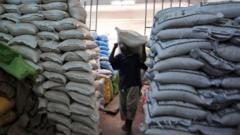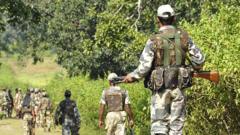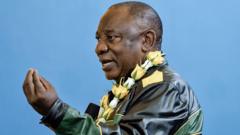The recent thaw in relations between Bangladesh and Pakistan, marked by trade agreements and revived political dialogues, raises alarms in India, where historical grievances linger. Analysts suggest that this rapprochement may be a strategic maneuver against Indian influence, while unresolved past atrocities remain a significant barrier to lasting peace.
Bangladesh and Pakistan Begin to Mend Historical Ties, Sparking Regional Concerns

Bangladesh and Pakistan Begin to Mend Historical Ties, Sparking Regional Concerns
As Bangladesh and Pakistan move towards normalization of relations, India watches closely, fearing potential shifts in regional dynamics.
In an unexpected shift, Bangladesh is rekindling its relationship with Pakistan amidst significant political changes, prompting concerns from neighboring India. The re-emergence of ties began when Bangladesh recently imported 50,000 tonnes of rice from Pakistan, marking the first direct trade between the nations in decades. Coinciding with this economic cooperation are revived military contacts, new direct flight routes, and a simplification of visa procedures, creating a renewed sense of collaboration.
Historically, the bond between Bangladesh and Pakistan has been fraught due to events from the Bangladesh Liberation War in 1971, which saw India supporting the Bengali quest for independence from Islamabad. In the years following Bangladesh's emergence as a separate entity, ties have fluctuated, with Bangladesh maintaining a pro-India stance, particularly during Sheikh Hasina's lengthy tenure since 2009. However, Hasina's recent political exile to India due to mass protests has led to a surprising thaw in relations with her former adversary.
Former Bangladeshi diplomat Humayun Kabir reflects that the previously cold relationship is transforming into one more characteristic of "normal neighbors." Meanwhile, India remains wary, as the deep-rooted distrust and historical grievances from 1971 cast a shadow over negotiations. India has taken note of the situation, opting not to extradite Hasina despite Bangladesh's requests, while diplomatic relations between Dhaka and Delhi remain tense.
Experts like Ayesha Siddiqa view the rapprochement as a strategic alliance focused on countering Indian dominance in the region. Several diplomatic interactions between the interim Bangladesh government and Pakistan’s leadership signal intentions to strengthen ties further. Additionally, military cooperation is on the rise, with Bangladeshi forces participating in joint exercises with Pakistan, raising security alarms in New Delhi.
Veena Sikri, India’s former high commissioner to Bangladesh, warns that rekindled ties between Dhaka and Islamabad could reopen wounds, particularly due to Pakistan’s historical ties with Bangladeshi Islamist parties that opposed its independence. Amid Dilli's apprehensions, analysts emphasize that while Bangladesh may wish to recalibrate its foreign policy, it must tread carefully given its intricate economic and cultural ties with India.
The complexities of the past, including demands for apologies over wartime atrocities, remain barriers to full normalization of relations. Pakistani military officials acknowledge these historical grievances yet assert that both sides need to address their respective issues for a robust partnership. Economists suggest that increasing bilateral trade could benefit both nations, yet existing trade restrictions pose challenges to this potential growth.
As Bangladesh anticipates general elections later this year, the evolving geopolitical landscape will be critical for ensuring peace and stability in the region, particularly for India, which seeks a favorable and friendly neighboring state. The developments ahead appear pivotal, with high stakes for all parties involved.





















